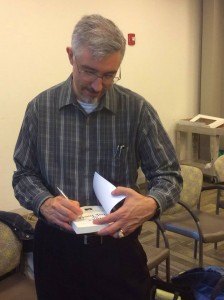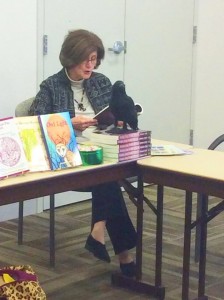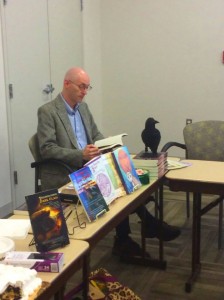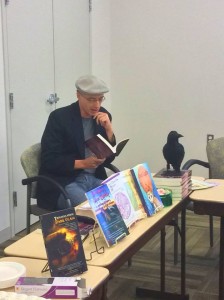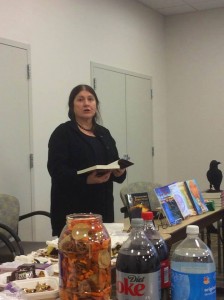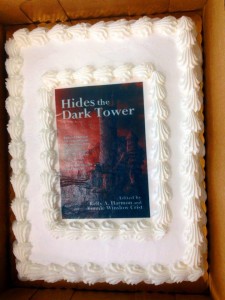You’ll enjoy reading my interview of Anatoly Belilovsky, another author whose story appears in the anthology Hides the Dark Tower.
 Anatoly Belilovsky is a Russian-American author and translator of speculative fiction. His work has appeared in the Unidentified Funny Objects anthology, Ideomancer, Nature Futures, Stupefying Stories, Immersion Book of Steampunk, Daily SF, Kasma, Kazka, and has been podcast by Cast of Wonders, Tales of Old, and Toasted Cake. He blogs about writing here, pediatrics here, and his medical practice web site is here. He was born in what is now Ukraine, learned English from Star Trek reruns, worked his way through a US college by teaching Russian while majoring in chemistry, and has, for the past 25 years, been a paediatrician in New York, in a practice where English is the fourth most commonly spoken language.
Anatoly Belilovsky is a Russian-American author and translator of speculative fiction. His work has appeared in the Unidentified Funny Objects anthology, Ideomancer, Nature Futures, Stupefying Stories, Immersion Book of Steampunk, Daily SF, Kasma, Kazka, and has been podcast by Cast of Wonders, Tales of Old, and Toasted Cake. He blogs about writing here, pediatrics here, and his medical practice web site is here. He was born in what is now Ukraine, learned English from Star Trek reruns, worked his way through a US college by teaching Russian while majoring in chemistry, and has, for the past 25 years, been a paediatrician in New York, in a practice where English is the fourth most commonly spoken language.
Here’s the interview:
Poseidon’s Scribe: When and why did you begin writing fiction?
Anatoly Belilovsky: I vaguely remember writing fanfic as a child, at least in my mind: a prequel to 20,000 Leagues Under the Sea, a sequel to the original Lost World of Arthur Conan Doyle, apocrypha of Strugatsky’s Inhabited Island. Nothing I’d ever want to show anyone.
I did publish a couple of stories in my college’s annual magazine, one of them acquired by Gordon van Gelder [editor of The Magazine of Fantasy and Science Fiction] back when he himself was an undergraduate. Nothing I’d want to show anyone these days, either.
P.S.: What genres have you written in?
A.B.: Alternate history is probably my favorite. When I write SF and fantasy, they tend to skirt very close to mainstream/literary. In humor, I prefer character-driven comedy to situational comedy — a mathematician who can only think of mathematics in terms of Russian swear words seems to have had the greatest impact so far, though an epidemic of otaku based on Russian cartoon characters, and Wagner leading a musical invasion of France in 1870, both got a few chuckles here and there.
P.S.: In what way is your fiction different from that of other authors in your genre?
A.B.: I doubt I am the only one who acknowledges a debt to Gogol, Chekhov, Nabokov, and Poe as their major influences. It isn’t as common as Delany and Le Guin, but certainly not unique. There are several excellent bilingual writers, several physician writers I am proud to call twice-colleagues, several of anything I can ever be labeled as. I guess this is a question best asked of my fans. Shouldn’t take too long to interview both of them.
P.S.: What are the easiest, and the most difficult, aspects of writing for you?
A.B.: Characterization is easiest: I seem to have a good handle on subtext which is what characterization is all about.
Plotting is the hardest. If I do my characterization right, the characters will pick proper fights with each other, the Universe, and the absurdity of existence. If not, they go through the motions, listlessly.
P.S.: You’ve had many short stories published. Have you written any novels or do you intend to?
A.B.: I have not so far been chosen by a novel to be the instrument of its creation. Also, plotting: novels seem to depend on it more than short stories do.
P.S.: In describing yourself, you cite your Russian childhood, Star Trek, chemistry, and pediatrics. How do you weave each of those threads of your life into your stories?
A.B.: Well, I learned English from Star Trek, so that’s huge. The chemical principles of self-assembly and tertiary structure — if you think about it, that’s how the best stories work, the characters and their worlds interacting organically, friendships and conflicts never feeling forced or synthetic. Pediatrics — after 30 years, subtext is second nature, you get to read whatever is left unsaid, tease out the meaning behind the exact phraseology used. And growing up speaking a highly inflected language I think gave me a heightened understanding of structure and mechanics of English.
Also, seriously, when everything you say can be used by Big Brother against you, subtext becomes a way of life. I was beta reading a story once that had this exchange:
A: “We hunt dragons.”
B: “There are no dragons.”
A: “That’s because we killed them all!”
My suggestion was to change it to:
A: “We hunt dragons.”
B: “Dragons are extinct.”
A: “You are welcome!”
Same idea, but I think communicating it through subtext made the speaker more matter-of-fact and therefore more believable.
P.S.: Your stories often contain literary references, some perhaps unfamiliar to American readers. Are your tales intended to be enjoyed on several levels by the casual reader, the well-read bibliophile, and the researching puzzle-solver?
A.B.: Yes. In fact, this is exactly what several reviewers and a number of beta readers said. “Because of your story I googled [X] and wow [X] is now my new favorite thing and likely the name of my firstborn and my next band” — this is what writers live for!
Examples: I wrote a story about Night Witches, a women’s night bomber unit in the Soviet Army in WWII. Got an email from a reader who happily discovered the unit actually existed! Another reader now peppers conversations with Russian swear words. Mea maxima culpa! And Chrestomathy, the patchwork alternate literature story, got a whole bunch of conversations going about Pushkin and Gogol and the nature of ethics.
P.S.: Your Twitter stream abounds in puns. What is it about that form of humor that intrigues you?
A.B.: I immigrated to US with my parents in 1976, and by end of high school and start of college in ’78 my English was fully functional, but no more. It was on a winter day in 1979 that I felt an almost audible *click* as English became *my* language, and the first manifestation of that was that I started making puns. I scribbled in the margins of my notebooks, Q and A jokes, knock knock jokes, shaggy dog stories ending in a terrible pun —
Also, I always liked math. And math teaches us that the shortest distance between two puns is a straight line.
One of my multilingual idols, Vladimir Nabokov, excelled at puns. Pale Fire has to be one of my favorite books of all time.
P.S.: Your story in ![Pageflex Persona [document: PRS0000039_00001]](https://stevenrsouthard.com/wp-content/uploads/2015/10/HidesTheDarkTower-DigitalCover-FINAL2-200x300.jpg) Hides the Dark Tower is “Deep Into That Darkness Peering.” Can you tell us what inspired that homage to Poe (with a nod to Chekhov)?
Hides the Dark Tower is “Deep Into That Darkness Peering.” Can you tell us what inspired that homage to Poe (with a nod to Chekhov)?
A.B.: Well, Poe is… Poe! I mean, who else can write such purple prose and get away with it? “Deep Into That Darkness Peering” is actually one of three Poe’s purple prose pastiches I perpetrated, the other two published in Stupefying Stories Showcase. Melodrama, bathos, run-on sentences from hell (in my son’s estimation) — and I’m getting paid for it! MWAHAHA! [clears throat] Umm, where was I?
I also admire Poe for what has to be the biggest Deus Ex ending ever. Remember how “The Pit and the Pendulum” ends? The French enter the city and save the protagonist! Agency? Who needs agency when you have the French army! Now I don’t have to feel guilty for how I ended “Deep Into That Darkness Peering.”
Chekhov, by the way, is the author of the best bit of subtext ever written. In “The Lady with the Dog,” a man approaches the lady and the dog. The dog bristles. Quote follows:
“He does not bite,” she said and blushed.
Think about it.
P.S.: What is your current work in progress? Would you mind telling us a little about it?
A.B.: An alternate history in which Tsar Nicholas II caught the bullet meant for Prime Minister Stolypin in 1911. No WWI, no Revolution. Murder mystery involving several characters born before the point of departure and famous in our timeline for — blimey, I better go and write this, what?
Poseidon’s Scribe: What advice can you offer aspiring writers?
Anatoly Belilovsky: Don’t only take writing advice from writers who wrote stuff you wish you’d written. Even people whose writing you don’t find appealing can help you develop your own voice. And if then you develop taste for their work — well, growth happens.
Readers aching to find out more about Anatoly Belilovsky (you know you’re one of them) can visit his website and follow him on Twitter.
Poseidon’s Scribe
 Why? For one thing, body language helps break up long strings of dialogue quotes to keep the text more readable and interesting. Body language allows you to show internal conflict within a non-Point-of-View character by contrasting that character’s words with some clashing body language. Also, body language can emphasize the emotions of a character by going beyond mere spoken words.
Why? For one thing, body language helps break up long strings of dialogue quotes to keep the text more readable and interesting. Body language allows you to show internal conflict within a non-Point-of-View character by contrasting that character’s words with some clashing body language. Also, body language can emphasize the emotions of a character by going beyond mere spoken words.
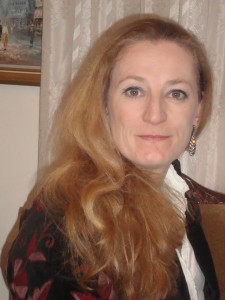
![Pageflex Persona [document: PRS0000039_00001]](https://stevenrsouthard.com/wp-content/uploads/2015/10/HidesTheDarkTower-DigitalCover-FINAL2-200x300.jpg)


